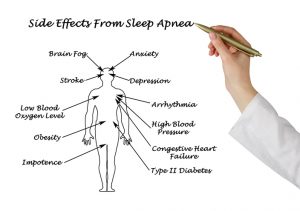
Study author Dirk M. Hermann said, “Although sleep disorders are common after a stroke, very few stroke patients are tested for them. The results of our review show that should change, as people with sleep disorders may be more likely to have another stroke or other negative outcomes than people without sleep problems, such as having to go to a nursing home after leaving the hospital.”
The researchers further recommend that patients with sleep apnea be treated with a CPAP device as it improves post-stroke outcomes.
The researchers reviewed a number of studies examining stroke and sleep disorders. They combined the collected data for a meta-analysis.
Sleep disorders fall into two categories: sleep-breathing problems and sleep-waking problems. Sleep apnea is an example of a sleep-breathing problem and insomnia is an example of a sleep-waking problem.
The researchers found that sleep-breathing problems are linked with stroke risk and poor stroke recovery. Sleep-waking problems are also linked with a higher stroke risk and poor recovery, but research on this association is limited.
Obstructive sleep apnea as a risk factor for stroke and a post-stroke complication
Researchers have found that obstructive sleep apnea (OSA) remains a risk factor for stroke, even after controlling for other risk factors. Researcher Dr. Brian Murray said, “There are ways to prevent sleep apnea from occurring. Keep your body weight low, as obesity is a major contributor to sleep apnea. Avoid medications and substances that relax the airways and cause snoring, such as sedatives and alcohol. And sleeping on your side can minimize sleep disordered breathing.”
OSA is also a common occurrence after stroke, with at least 60 percent of patients experiencing sleep apnea after stroke.
Screening stroke patients for sleep apnea is highly important, because this sleep disorder can impede stroke recovery and increase the risk of an additional stroke.
Ian Joiner, director of stroke for the Heart and Stroke Foundation, added, “This innovative Canadian research continues to show that there is more to learn about rehabilitation and recovery following stroke. Reflecting these advances in tools such as the Best Practices Recommendations for Stroke Care will help improve outcomes for Canadians.”
The new recommendations are the fourth update of the Canadian Best Practice Recommendations for Stroke Care. It is the first time sleep recommendations have been offered as a means to treat stroke.